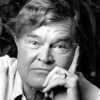Paul Fussell

Paul Fussell
Paul Fussell, Jr.was an American cultural and literary historian, author and university professor. His writings cover a variety of topics, from scholarly works on eighteenth-century English literature to commentary on America's class system. Fussell served in the 103rd Infantry Division during World War II and was wounded in fighting in France. Returning to the US, Fussell wrote extensively and held several faculty positions, most prominently at Rutgers Universityin New Brunswick, New Jersey, and at the University of Pennsylvania in Philadelphia,...
NationalityAmerican
ProfessionHistorian
Date of Birth22 March 1924
CountryUnited States of America
If the term discussion has always seemed to me to imply mild warnings of wasted time, workshop sets off a clangorous alarm.
Irony is the attendant of hope and the fuel of hope is innocence.
So many bright futures consigned to the ashes of the past.So many dreams lost in the madness that had engulfed us.Except for a few widely scattered shouts of joy,the survivors of the abyss sat hollow-eyed and silent, trying to comprehend a world without war.
The balls used in top class games are generally smaller than those used in others.
Every war is ironic because every war is worse than expected. Every war constitutes an irony of situation because its means are so melodramatically disproportionate to its presumed ends.
There is no Apocalypse.
Most people who seek attention and regard by announcing that they're writing a novel are actually so devoid of narrative talent that they can't hold the attention of a dinner table for thirty seconds, even with a dirty joke.
The past is not the present: pretending it is corrupts art and thus both rots the mind and shrivels the imagination and conscience.
Travel sharpens the senses. Abroad one feels, sees and hears things in an abnormal way.
Tourism requires that you see conventional things, and that you see them in a conventional way.
If I didn't have writing, I'd be running down the street hurling grenades in people's faces.
I find nothing more depressing than optimism.
Anybody who notices unpleasant facts in the have-a-nice-day world we live in is going to be designated a curmudgeon.
Americans are the only people in the world known to me whose status anxiety prompts them to advertise their college and university affiliations in the rear window of their automobiles.